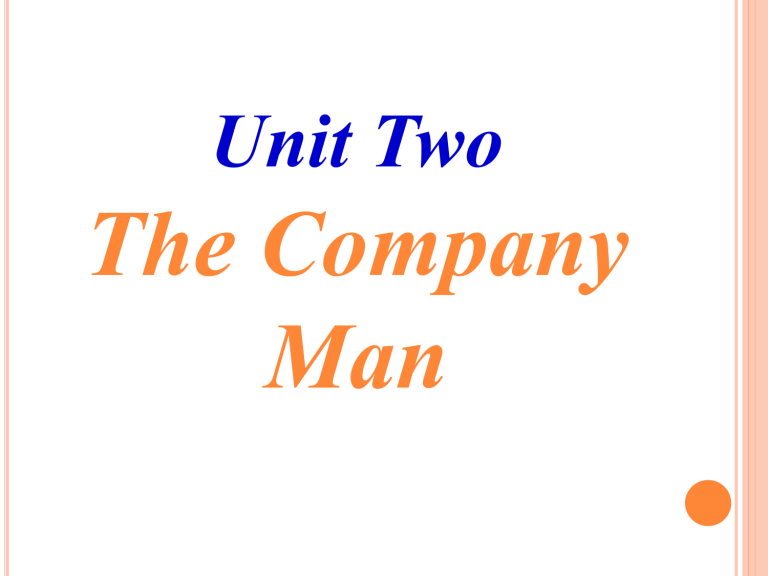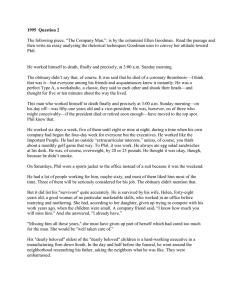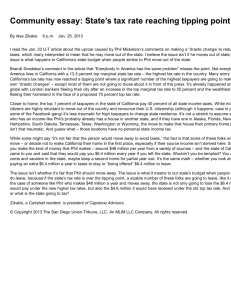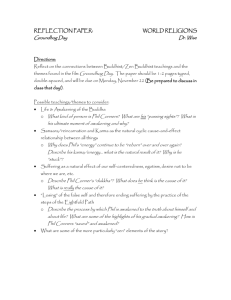让颜色生动起来
advertisement

Unit Two The Company Man CONTENTS Lead-in Text Study Exercises Oral Activities LEAD-IN The author: Ellen Goodman Ellen Goodman (1941-), journalist and columnist who writes for Newsweek, the Detroit Free Press, and the Boston Globe. graduated (cum laude) from Radcliffe College. She was awarded the Pulitzer prize for Distinguished Commentary in 1980. She began her working career in 1963. She was named newspaper woman of the year by the New England Press Association in 1968, and columnist of the year by the New England Women's Press Association in 1975. Since 1979, Goodman has published five collections of her columns dealing with contemporary themes: Close to Home; At Large; Keeping in Touch; Making Sense; Value Judgments. Her Pulitzer Prize winning commentary appears in more than 375 newspapers. Goodman has a strong interest in social changes. She has discussed family, politics, ethics and male and female relationships. Her columns have won vast numbers of readers for their keen, insightful observations and clever wit. She writes about what is in the news, on her mind, and of concern to women and men across the country. The Company Man This essay is taken from Close to Home. It describes a workaholic, the vice president of a company, who works himself to death and leaves behind a wife and three adult children. T YPE A & T YPE B PERSONALITY Friedman and Rosenman (1959) conducted studies on the link between stress and heart disease. One of the outcomes was the discovery of Type A and Type B personalities. TYPE A People who are classified as having Type A personality have characteristics like: highly active, competitive, aggressive, hostile, impatient, fast talking and thinking. TYPE A They have a sense of time urgency, find it difficult to relax, and often become impatient and angry when they get delayed (or if they are going to be late) or are around other people whom they view as incompetent. It is assumed that Type A people tend to have more risk of heart disease than Type B people. Type B People who are classified as having Type B personality are better at relaxing without feeling guilty and working without becoming anxious or agitated. Some of the other characteristics include being more relaxed about time (they don't get overly stressed about being late), and are not easily angered. TYPE B You probably know people who just seemed to be relaxed people who don’t get angry often; these are the characteristics of a Type B. They are the opposite of Type A people. Which do you generally belong to, Type A or Type B personality? What pressures do you think are company staff under? Name a few of them. 1. Pressure from work:not enough rest; endless work to fulfill even on holidays. 2. Pressure from competition of new staff:competent new comers in the company bring about great pressure for the present ones. 3. Pressure of one’s own further development: these cause pressure and makes some white-collar workers worried. Some even recharge themselves while working. 4. Pressure from feeling: unsatisfying problems in family. Some are faced with divorce, marriage, remarry. All these impose pressures, because they make it difficult to concentrate on one’s work. 5. Pressure from interpersonal relationship: office philosophy TEXT COMPREHENSION Exercise II (P23) Answer the following questions. What have you learned from the first sentence? Why are these adverbs “finally and precisely” used? Why does the author repeat it? Key: Concise as it is, it provides information of “who”, “what”, “how” and “when”. “Finally” suggests the doomed ending of the workaholic. “Precisely” emphasizes his devotion to work, as he died on a Sunday, a day when people are supposed to take a rest. By repeating the author proves the tragic nature of Phil’s death. It reveals the personality of the man and implies that the man is destined/doomed to be exhausted. 1.What was the man’s position in the company? Why does the author report it in detail? Key: He was one of the six vicepresidents and one of the three possible successors to the president. The author reports it in detail to show how successful he had been and importantly, to reveal how fierce the competition was in the company. 2. What do you learn from paragraph 5? Key: To Phil, Saturday is not a day to relax, but only a time to change to a casual wear. 3.What did Phil’s wife mean when she answered “I already have”? Key: She meant to say that Phil was so engrossed in work that he neglected his family. She had already lost him to his work for many years. 4. What is meant by the sentence “she would be well taken care of” in Paragraph 8? Key: It means that the company Phil worked for would provide some financial help for his wife so as to relieve her of any possible worries about finance. 5. Why is the phrase “dearly beloved” repeated when referring to his children in Paragraph 9? Key: The phrase “dearly beloved” is repeated to create a sarcastic effect for his relationship with his children was far from being close or intimate and he devoted too little to his children. 6. What do you think is the relationship like between Phil and the three children? Key: Successful as he was as a corporate man, Phil was a failing father. His eldest son knew so little about him that he had to research his father by asking the neighbors what he was like. His daughter had nothing to say when staying along with him. And his younger son, also his favorite, remarked bitterly that his father and he only boarded at the home. The relationship between Phil and his children was distant and estranged. 7. What is the implication of the ending? Key: It implies the story of Phil sees no end: He will soon be replaced by an equally hardworking guy who may following in his steps and repeat the same tragedy. Bosses are always on the lookout for workaholics and they are never in short supply. The ending is full of sarcasm and bitterness. 8. Can you raise some aspects in Phil’s life to illustrate his being a workaholic? Key: over-long working time, no hobby, monotonous diet, estranged relationship with family members… Do you think it is a sheer waste of life to die so young for working so hard? How can you learn from the story of Phil? (open) Structural Analysis Paragraph (s) Main idea 1 The introductory part which reports the sudden death of Phil and his devotion to work. 2-6 This part reports how devoted the man was to his work. 7-13 This part describes Phil’s role in his family. 14-16 This is the end of the essay. After the cause of Phil’s death being restated, the author goes on to report the company president’s inquiry for his successor. LANGUAGE POINTS to death used after an adjective or a verb to emphasize the action, state, or feeling mentioned e.g. worried to death; frightened to death; bored to death; starve to death; put to death obituary 1) n. [C] a published notice of death, sometimes with a brief account of the dead person’s life. 2) adj. e.g. an obituary notice 讣告 FUNERAL NOTICE CANSON, Joyce Rea Sept 5, 1941-Oct 12, 2006… Mother of Robert Beverly, Richard Beverly, and Sheila Daniels. Mother-in-law to Sheryl Beverly, Kim Beverly, and Darius Daniels. Beloved “Granny” to Robert, Anjalee, Sheila, Clarissa, Raven, and Kathryn. Sister to Charlotte Smith, Gloria Johnson (husband Ronald), and the late Jimmy Thorntona (late wife Polly). Daughter to the late Charles Canson and Emma Johnson. Survived by many cousins, nieces, nephews, and good friends. Friends and family are invited to attend a celebration of Joyce’s life, Tuesday, October 17, 2006 at 12 pm at Sierra 2 Center, 2791 24th Street, Sacramento, CA 95818. coronary thrombosis obstruction of a coronary artery by a thrombus, often leading to destruction of heart muscle (心脏的)冠状动脉血 栓症 . …one of six vice-presidents… 1) 汉语中表示副职的头衔一般都冠以“副”字,英译时需 视词语的固定搭配或表达习惯等情况,可选择vice, associate, assistant, deputy等词。相应而言 ,vice使用面较广。 副总统(或大学副校长) vice president 副主席(或系副主任) vice chairman 副总理 vice premier 副部长 vice minister 副省长 vice governor 副市长 vice mayor 副领事 vice consul 副校长(中小学) vice principal 2) 行政职务的副职头衔与学术头衔的“副”职称往往用不同的 词表达,最为常用的英语词是 associate 。 副教授 associate professor 副研究员 associate research fellow 副主编 associate managing editor 副审判长 associate judge 副主任医师 associate senior doctor 3) 有些英语职位头衔,如manager, headmaster,其副 职头衔可冠以assistant 。 副总经理 assistant/deputy general manager, assistant/deputy managing director 大堂副理(宾馆) assistant manager 4) 以director 表示的职位的副职常以deputy director表示。此外,secretary, mayor, dean 等头衔的副职也可冠以deputy。 副秘书长 deputy secretary-general 副书记 deputy secretary 副市长 deputy mayor 副院长 deputy dean conceivably (adv.): in a manner that can be imagined or believed. e.g. If we persist in working that hard, conceivably we’ll harvest a promising progress in the future. a. conceivable e.g. 难以想象这么小的孩子能跑这么快。 It is hardly conceivable that such a small/little kid can run so fast. 她千方百计地赚钱。 She earned money by every conceivable means v. conceive 1) A patriot never conceives of betraying his/her motherland in any case. to imagine; think 2) To gain an upper hand in the cutthroat competitiveness, we have to conceive a plan to make ourselves superior. to form or develop in the mind; map out 3) I couldn’t conceive the implication of that sentence, although he explained again. to comprehend mentally; understand 4) She was told she couldn’t conceive. Hence she got no chance to be a mother. to become pregnant with (a child) executive 1) n. 2) a. of, relating to, capable of, or suited for carrying out or executing e.g. An efficient executive must possess great executive ability. execute v. 1) A government executes the decisions of the ruling party. ♠ (fml) to put into effect; carry out 2) The victim’s relatives expected to execute the murder. ♠ to put to death, especially by carrying out a lawful sentence. overweight a. fat, obese, stout, pudgy, plump, chubby,portly These adjectives mean having an abundance and often an excess of flesh. The most neutral term is overweight. 1) “Fat” is the most usual and direct adjective to describe people with excess flesh, but it is not polite. e.g. That guy is not merely overweight but utterly fat. 2) “Obese”:[o'bis] (fml or medical) (of people) very fat (Doctors use obese to describe people who are so overweight that they are unhealthy.) e.g. Obese patients are advised to change their diet. 3) “Stout” is sometimes used as a polite term to describe fatness. In stricter application “stout” indicates overall heaviness of the body. (身体胖得匀称) e.g. Even slim girls can become stout housewives. 4) “Pudgy” (infml) means short and fat. e.g. His pudgy fingers look really funny. 5) To be polite, we can use “plump” applies to a slight or attractive fullness of figure. e.g. Everybody loves Rita, the plump, rosy little girl. 6) “Chubby” indicates pleasant roundness in babies and cheeks. 7) portly: (literary) fat and round — used especially e.g. a about chubby toddler; chubby cheeks an old man e.g. The bishop was a portly middle-aged gentleman. EXERCISES 1. It is impolite to describe people with fatflesh using overweight excess ____, but ___________ is okay, for it’s neutral. 2. Doctors suggest people have less fast food, in orderobese not to be ______. 3. There was a time whenplump/stout the ____________ figure caught on. pudgy 4. Thechubby ______ kid has funny _______ fingers. survive v. live longer than sb. else, usually sb. closely related to you Practice 那老太太的子女都先她而去世了。 The old lady has survived all her children. . …DOING ENOUGH ODD JOBS TO STAY… a. 1) What an odd desk! We’ve never seen it. ★ strange 2) 1, 3, 5 and 7 are odd numbers. ★ (of numbers) that can not be divided by two; not even 3) She is wearing two odd shoes. ★ Of one of a pair, set, series, etc when the other(s) is/are missing 4) She made a toy out of odd pieces of the cloth. ★ extra; surplus; left over 5) Twenty-odd years later, you will be middle-aged. ★ (usu placed directly after a number) a little more than 6) He takes some odd bit of exercises, but nothing regular. ★ occasional; not regular or fixed odd jobs small jobs of various types, usu done for other people odds (assignment) . …THE FIFTY-ONE-YEAR OLD DECEASED HAD MEANT MUCH … dead, deceased, departed, late, inanimate dead常表语,指“死的”; deceased指人“最近死的”,多用于法律; departed指“最近死的”,多用于宗教,是委婉语, 仅指死者; late“已故的”,多用于刚死的人; inanimate意为“没有生命的,没有生气的”。 EXERCISES 1. The tiger has been dead_____ for at least two days according to the expert. 2. Thedeceased ________ man left no will or legacy. 3. In a funeral, the priest prays departed for the ________. late 4. The story is about the ____ hero. inanimate inanimate 5. Their _________ conversation is about the _________ stone. . … NEED HIM TO STRAIGHTEN OUT THE FINANCES — THE STOCK OPTIONS AND ALL THAT. straighten out ♣ straighten sth out To settle or resolve sth; to remove difficulties from sth e.g. With mutual help, we can straighten each other’s confusion ASAP. ♣ straighten sb out (infml) to remove doubt or ignorance in one’s mind e.g. Traditionally a teacher is expected to straighten puzzled students out. 1) THE FINANCES the stock options and all that and all that (jazz, rubbish, etc) (idm) (infml) and other similar things e.g. I got fed up with mathematics for its figures, tables, formulae and all that staff. . …A HEART-ATTACK NATURAL. (n.) person considered ideally suited for a role, a job, an activity, etc e.g. The black are regarded as naturals for sports. He doesn’t spend much time in learning playing violin, for he seems to be a natural for it.make inquiries about his replacement. . …to v. demand, require, claim, request 1). demand表示强烈要求。若主语是人,包含依据权 利要求;若主语是物,含义为需求或要求,可直接接 宾语。 2). require虽然有时可以与demand换用,但 require的确切含义应当是对所要求的事要绝对服 从,有时这种要求带有法律的或规章的强迫性。 3). claim要求承认自己对某物的所有权。 4). request指“通过正式手续或非常有礼貌、客气地 请求”, 常用于 “恐怕对方由于种种原因不能答应 ”的场合。 EXERCISES 1. The boss _________ demandedthat Mary finish the project before next Monday. 2. You are sincerely ________ requestedto be present at the gathering. 3. Every citizen may _____ claim the protection of the law. required to attend classes. 4. Students are _________ Exercise He had no outside “extracurricular interests,” unless, of course, you think about a monthly golf game that way. (Paragraph 4) Paraphrase: He had dedicated all his time to his work and had no hobby at all, except that he played a golf game every month, which cannot be taken as a hobby anyway. She had, according to her daughter, given up trying to compete with his work years ago, when the children were small. (Paragraph 7) Paraphrase: Their daughter said that, when the children were still small, her father had become a company man and her mother had given up any attempt to keep him at home. 1) widow n.→ widowed a. e.g. 她守寡十年了。 She has been a widow for ten years. 一个寡母要抚养四个孩子长大成人确实不易。 It’s really not easy for a widowed mother to rear up four children. 2) nerve n. → nervous a. → nerveless a. e.g. 当赛车手要有胆量。 It takes nerve to be a racing driver. 她胆怯地一笑。 She gave a nervous laugh. 刀子从她那无力的手中落下。 The knife fell from her nerveless fingers. 3) precise a. →precision n. → precisely adv. e.g. 那东西正好在她遗落的那个地点找到了。 It was found at the precise spot where she had left it. 你的报告不够准确。 Your report lacks precision. 那正是我的意思。 That is precisely what I mean. 4) compete v. → competitive a. → competition n. e.g. 几家公司正为争取一项合同而互相竞争。 Several companies are competing (against / with each other) for the contract / to gain the contract. 我们公司在世界市场上已不占优势。 Our firm is no longer competitive in world markets. 他获诗歌比赛第一名。 He came first in the poetry competition. 5) execute v. → execution n. e.g. 他因叛国罪被处死。 He was executed for treason. 这些计划最终得以实施。 The plans were finally put into execution. 6) preside v.→ president n. → presidency n. e.g. 首相主持内阁会议。 The Prime Minister presides at meetings of the Cabinet. 他被任命为板球俱乐部会长。 He was made president of the cricket club. 他获选连任总统。 He was elected to a second presidency. 7) marry v. → marital a. → marriage n. e.g. 哪位牧师来为他们主持婚礼? Which priest is going to marry them? 拉丽莎40几岁,徐娘半老,爱喝酒,婚姻也不如意。 A fading woman in her 40s, Larisa had both drinking and marital problems. 她的第一次婚姻维持了五年。 Her first marriage ended after five years. 8) company n. → accompany v. → companion n. e.g. 观其友则知其人。 You may know a man by the company he keeps. 我得要求你陪我去一趟警察局。 I must ask you to accompany me to the police station. 狗是忠实的伙伴。 A dog is a faithful companion. Fill in the blank in each sentence with an appropriate phrasal verb or collocation from the text. 1) The severe acute respiratory syndrome (SARS) is a fatal died of disease. Thousands of people in Asia have ________ it in the past two years. 2) Chinese fans often have to ________ stay up to watch the live transmission of European football matches. 3) Sometimes I don’t understand Jeremy; he seems to cares for have hurt the feelings of everyone who __________ him including his wife. 4) I doubt that they are able to get the problems __________________ straightened out before the deadline. 5) It was curious that the children should have ___________ picked out their grandparents easily from the old photographs. die of: stop living or come to the end of one’s life because of some disease e.g. 现在有很多人死于癌症。 Nowadays many people die of cancer. stay up: remain awake; not go to bed e.g. 她答应孩子们可以晚点儿睡,看他们最喜爱的电视 节目。 She promised the children they could stay up for their favourite TV programme. care for: like or love e.g. 他深深地爱着她。 He cares for her deeply. straighten out: deal with a problem or a confused situation and make it better, especially by organizing things e.g. 我们会把情况弄清的。 We’ll get the case straightened out. pick out: recognize sb. or sth. in a group of people or things e.g. 很容易从人群中辨认出他,因为他个子很高。 It’s easy to pick him out in a crowd because he is very tall. 1. He worked himself to death, finally and precisely, at 3:00 a.m. Sunday morning. Synonym: exactly 2. It said that he died of a coronary thrombosis — I think that was it — but everyone among his friends and acquaintances knew it instantly. Synonym: immediately 3. He was a perfect Type A, a workaholic, a classic, they said to each other and shook their heads — and thought for five or ten minutes about the way they lived. Antonyms: slacker, idler, loafer 4. He is survived by his wife, Helen, forty-eight years old, a good woman of no particular marketable skills, who worked in an office before marrying and mothering. Synonym: outlived 5. In the day and a half before the funeral, he went around the neighborhood researching his father, asking the neighbors what he was like. They were embarrassed. Synonyms: disconcerted, abashed 6. At the funeral, the sixty-year-old company president told the forty-eight-year-old widow that the fifty-oneyear-old deceased had meant much to the company and would be missed and would be hard to replace. Antonym: living 7. Phil was overweight and nervous and worked too hard. Antonyms: underweight, slim 8. You could have picked him out in a minute from a lineup. Synonym: queue Present Perfect Present Perfect Progressive 1) Present Perfect The present perfect expresses an action that is still going on or that has stopped recently, but still has an influence on the present. It puts emphasis on the result. Use of present perfect putting emphasis on the result Example: She has written five letters. the action that is still going on Example: School has not started yet. the action that has stopped recently Example: She has cooked dinner. the finished action that has an influence on the present Example: I have lost my key. the action that has taken place once, never or several times before the moment of speaking Example: I have never been to Australia. 2) Present Perfect Progressive The present perfect progressive expresses an action that has recently stopped or is still going on. It puts emphasis on the duration or course of the action. Use of present perfect progressive putting emphasis on the duration or course of an action (not the result) Example: She has been writing for two hours. the action that has recently stopped or is still going on Example: I have been living here since 2001. the finished action that has an influence on the present Example: I have been working all afternoon. The present perfect progressive focuses on course of the activity or event which may or may be finished. The present perfect focuses on the result of activity or event, or just the fact that something been achieved. the not the has PAY ATTENTION 1. 现在完成时表示动作从过去持续到现在不与具体的过去时间 连用。 They held a sports meeting last week. The sports meeting has lasted for two weeks. 2. just,already,yet,before,ever,never, up to these few days/weeks/months/years/present(now), so far 此类副 词或短语通常强调动作已经完成或者对现在产生的影响,常与 现在完成时连用。 eg.Have you _____been ever to Japan? I have _____ just finished my homework. already I have finished my homework ______. yet I haven’t finished my homework ____. 3. 现在完成时表动作开始于过去某一时刻,一直延续到现 在,或可能还要继续下去。这里的动词要用持续性动词。常 与for(+时间段),since(+时间点)连用. Mary has been ill for three days. Mary has been ill since three days ago. 短暂性动词也称做终止性动词、非延续性动词 或瞬间动词,表示动作不能延续,只是一瞬间就 结束的动作. 常见的短暂性动词有:come, go, arrive, reach, see, hear, close, open, leave, begin, start, lose, buy, fall, join, die, become, borrow, get up 等. 延续性动词:表示可以延续一段时间的动作或 状态。如:be,drink,fly,eat,keep,lie,live,rain等。 用法: 1、它们可以用于完成时态,说明某个动作的结 果还存在. e.g. He has come back. The film has begun. 2、这类动词不能和表示一段时间的状语连 用,但在否定句中,非延续性动词也可以 用表示一段时间的状语来修饰. e.g. I haven’t heard from Uncle Wang for a long time. We haven’t seen him since 1992. She hasn’t left home all her life. 3、还可改用一般过去时来表达. e.g. He came back a week ago. 4、也可用“It is ﹢一段时间﹢since…”句 型 来表达. e.g. It is a week since he came back. 非延续性动词可以转换成延续性动词 buy ------ have, borrow ----- keep, put on ------ wear, catch/get a cold ------ have a cold, come/go/become ------ be. 4. 有些现在完成进行时的句子等同于现在完成时的句子。 They have been living in this city for ten years. They have lived in this city for ten years. I have been working here for five years. I have worked here for five years. 5. 大多数现在完成进行时的句子不等同 于现在完成时的句子。 I have been writing a book.(动作还将继续 下去) 我一直在写一本书。 I have written a book.(动作已经完成) 我已经写了一本书。 They have been building a bridge. 他们一直在造一座桥。 They have built a bridge. 他们造了一座桥。 6. 表示状态的动词不能用于现在完成进行时。 I have known him for years. 我认识他已经好几年了。 * I have been knowing... 这类不能用于现在完成进行时的动词还有:love 爱,like喜欢,hate讨厌等。 Practice Put the verbs in brackets into the correct form: present perfect or present perfect progressive. ____________________ been playing 1) I’m pleased to say that the team have _______________ / have played (play) well all season. We can use either the present perfect progressive or the present perfect to talk about the activities or events that are repeated again and again until now. _____________________________ been putting / has put 2) In recent years, the company has (put) a lot of money into developing advanced technology. 3) They ___________________ have pulled down (pull) down most of the houses in this street, but they ___________________ haven’t touched (not touch) the old shop at the corner yet. 4) I _____________________ have been waiting (wait) for the prices of the houses to come down, but I think I _____________ have waited (wait) too long and the prices are beginning to go up again. 5) I __________________ have just picked (just pick) ten pounds of strawberries! I ____________________________________ have grown / have been growing (grow) strawberries for years but I _________________ have never had (never have) such a good crop before. 6) It was lovely at eleven o’clock, but since then the sky _____________________________ has been getting / has got (get) steadily darker and the has been rising / has risen (rise). I’m afraid the wind _____________________________ has come (come) to an end. fine spell ___________ We can use either the present perfect progressive or the present perfect to talk about an action which began in the past and is still continuing or has just finished. been (be) a junior clerk for three years. __________ 7) Peter has Lately he ___________________ has been looking (look) for a better post but so far he ______________ hasn’t found (not find) anything. 8) Ann ___________ has failed (fail) her driving test three times because she’s so bad at reversing. But she has got (get) a bit ________ better at it. 1. 如果你不把每月打次高尔夫球算作是业余 爱好的话,他就没有什么工作以外的“业余 爱好”可言了。 2.“这些年来他不在身边”,她一定早就放弃 了曾经有过的对丈夫的深深牵挂。 3. 就是他还想方设法把父亲从工作中“抓” 出来,让父亲疼爱自己,待在家里。 4. 在葬礼上,60岁的公司总裁对48岁的寡妇 说,她那51岁的亡夫对公司非常重要,人们 将怀念他,他是无法取代的。 Translate the following sentences into English. 我的顶头上司是一个典型的工作狂,一年365天每天工作10 个小时以上。 (workaholic) A workaholic is a person who works obsessively and finds it difficult to stop. My immediate boss is a typical workaholic, for he works for over ten hours each day all the year round. Practice: 许多日本人都是工作狂。 Many Japanese people are workaholics. 他终生醉心于工作,天天从早画到晚。 He was a lifelong workaholic, who painted dawn to dusk seven days a week. 校长十分注重课外活动。他认为,课外活动有助于培养学 生对外部世界的浓厚兴趣。 (extracurricular) Extracurricular activities are the part outside the regular course of work or studies at a school or college. The principal attaches much importance to extracurricular activities and he believes that they will help to cultivate students’ tremendous interest in the external world. Practice: 她参加了许多课外活动,如音乐﹑ 运动﹑ 戏剧。 She’s involved in many extracurricular activities, such as music, sport and drama. 星期一早上,他总是快速冲个澡,胡乱吃块三明治,接着 赶着搭出租车去上班。 (grab) To grab sth. means to have or take (sth.), esp. in a casual or hasty manner. He always grabs a shower, a sandwich and then a taxi to go to work every Monday morning. Practice: 咱们赶快吃点三明治就去看电视吧。 Let’s grab a quick sandwich and watch TV. 随便找个地方坐,别客气。 Grab a seat and make yourself at home. 没有什么能够取代内心深处最深切的爱。 (replace) replace sb. / sth.: take the place of (sb. / sth.) Nothing can replace the profoundest love in one’s heart of hearts. Practice: 机器人逐渐代替了装配线上的工人。 Robots are replacing people on assembly lines. 有什么东西能代替母爱吗? Can anything replace a mother’s love? 他被认为是总裁职位的当然人选,因为他已经做了近十年 出色的副总裁。(natural n.) natural: person considered ideally suited for a role, a job, an activity, etc. He is considered a natural for the post of the president, for he has been an excellent vicepresident for almost ten years. Practice: 他是李尔王这一角色的理想人选。 He’s a natural for the role of Lear. 她不用学跑步技巧,她天生就擅长跑步。 She doesn’t have to learn how to run: she’s a natural. 他是一个经典人物,因为他是工作累死的。 他们都相信,假如他能多活5年的话,将自然 被提拔为一把手。他一直被誉为同事们的典 范。他一周工作6天,一天工作10多个小时。 他的兴趣只限于工作。当然,他偶尔锻炼一 下,以保持身体健康。他将任何形式的娱乐 活动都视为浪费时间。他太忙,没有时间和 孩子待在一起,结果跟孩子们疏远了,至少 孩子们是这么想的。然而,他对公司来说却 非常重要,公司每个人都爱他,甚至崇拜他 ,因为在他们眼里,他几乎完美。但是,谁 来帮助这孤儿寡母收拾他去世后的残局呢? Fill in each blank in the passage below with ONE word you think appropriate. Americans average 25.1 working (1) hours ______ per person in working age per week, but the Germans average 18.6 hours. The average American works 46.2 weeks per while the French average 40 weeks per year. year, (2) ______ less than Why do western Europeans work so much (3) _____ Americans? Recent work argues that these differences result (4) _____ from higher European tax rates, but the vast empirical labor supply literature suggests that tax rates can (5) ________ explain only a small amount of the differences in hours between the U.S. and Europe. Another popular view by longis that these differences are explained (6) ____ standing European “culture,” yet Europeans worked more than Americans as (7) _____ late as the 1960s. We believe that European labor market regulations, advocated by unions in declining European industries who argued “work less, work difference between the all” explain the bulk of the (8) ___________ U.S. and Europe. These policies do not seem to have increased employment, but they may have had a more society-wide (9) ___________ influence on leisure patterns because of a social multiplier where the returns to leisure increase as taking longer vacations. more people are (10) _______ Oral Activities Having a Discussion and Debate on the Following Topic Viewpoints: Live to work VS Work to Live Do what you love VS Love what you do Some people work to live. These people view their work or careers largely as toil because their purpose is to earn a living. Their real interests lie elsewhere, and their work or careers are only means to an end, not an end in itself. Some of these people try to cut corners, to gain the maximum pay with the minimum of effort. Others do indeed take great pride in their work, and put great effort in doing their jobs well, but their jobs simply are not the centers of their lives. Some people agree to the opinion that hard work is all for the sake of living. Work to Live: From childhood, people have to study hard so as to enlarge their knowledge, to improve the quality and to increase the experience for a social being. After they step into the social stage, they work diligently every day to maintain their jobs, to promote their career positions and to run their own business successfully. This state of mind might agree with the majority. The sweat dropped today is for the sake of tomorrow’s harvest, in other words, living is the origin and basis of their work. They have the belief that the harder they work, the more the rewards they will get. Live to Work: Certain people, it is said, live to work. This is shorthand for saying that their lives center on their work or careers, and that achievement in their professions is a major source of satisfaction and meaning in their lives. Money may or may not be a major motivation for these people. In some cases, achieving huge levels of pay (as is the case with many senior corporate executives, such as CEOs) is regarded more as a means of keeping score and proving your relative worth versus other people, than it is for the money itself. Some people take the views that work is the purpose and ambition of their lives. They can not imagine how life will be without work. Work for them is destiny. In this kind of people’s minds, the destiny has been rooting in their deep heart, which leads them to work harder and harder, which encourages them to make consistently brave and meaningful new tries and which makes them have a faith to live a worthwhile life.





